#this show really humanized these students and god i wish such compassion and empathy could always be extended to people with depression
Text
queer rep in 《鸣龙少年》 The Hope (2023)
i just finished bingeing all 30 episodes last night and i thought i was over this, but i'm really not.
Yu Yang (禹洋) is a shy senior in Class 11 with a stammer. in ep. 5, we learn that due to health issues, he took an extended leave from school and thus had to repeat his second year, so he's a year older than his peers. his mother is well-meaning but overbearing, and he was made the target of quite egregious bullying before he joined Lei Ming's (雷鸣) class. throughout the show, we see him become more and more willing to voice his own opinions and set boundaries, esp. with his mother.
(a side point, but i absolutely adore how the show did not pathologize his stammer as a bad thing he had to be "cured" of; it's through unconditional acceptance and encouragement from the adults in his life and his friends that we see him naturally come out of his shell.)
unlike his four friends in Class 11, he doesn't seem to be embroiled in any of their tangled 感情线 / "love" lines, nor does he seem to have one at all—until ep. 21.
on new year's day, the Class 11 CPs are a mess. Jiang Qinglang (江晴朗) confesses to Cheng Yushan (程雨杉), leaving poor Bian Xiaoxiao (边晓晓) who likes JQL and Li Ran (李燃) who likes CYS behind.
so when the fireworks go off, JQL and CYS are togther, whereas BXX and LR are together—contrary to how the show has been pairing them thus far.
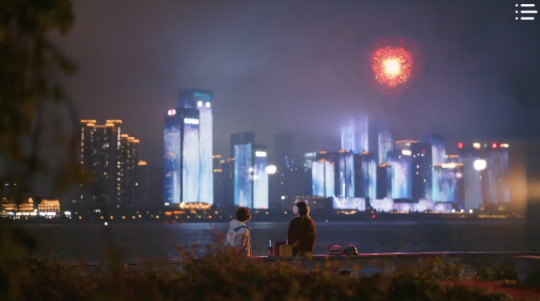
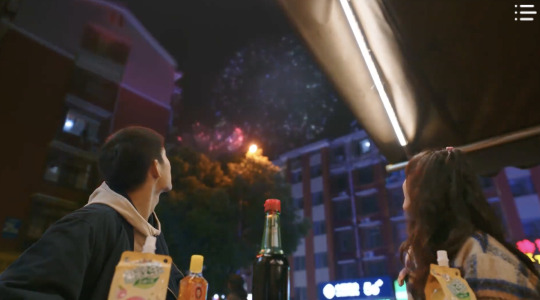
then we cut to YY, who is watching the fireworks alone, but about to text someone.
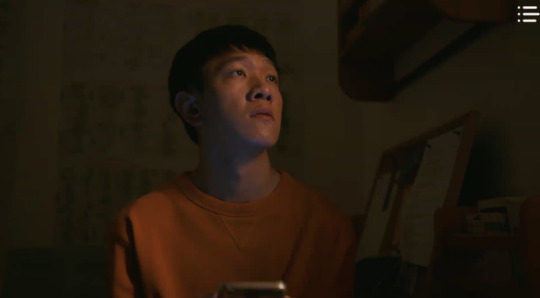
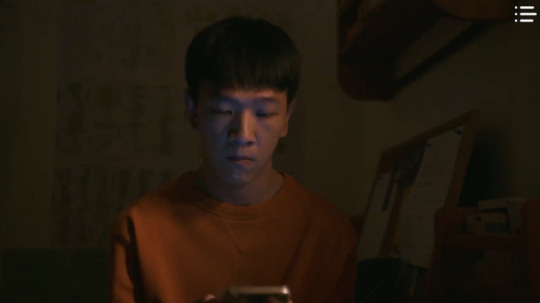
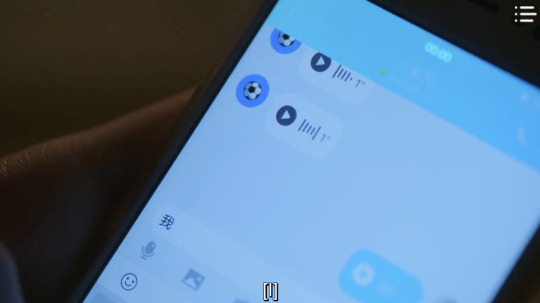
that's a name we haven't seen before! Wu Fan (吴凡), i wonder who that is?
importantly, we see him delete the "I" and instead wish this person "happy new year."
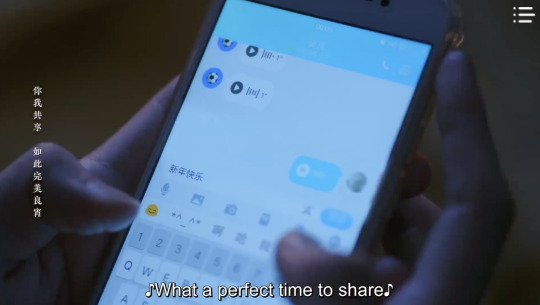
the entirety of ep. 21 was about confessions, crushes, dating/breaking up/moving on, and the innocent and pure feelings we experience in our 青春 / youth.

so it's truly not that big of a stretch for me to think that what YY may originally have been intending to write was “我喜欢你” / "I like you."
then, in ep. 24, Lei Ming takes his class on a trip to Qingbei University in Beijing. and it's there we finally learn who the mysterious WF is.
four years ago in 2015, an older student once stood up for the bullied YY and ended up with quite a nasty beating.


as YY quietly cleans his savior's injuries, they have a brief exchange:
Yu Yang: I'm sorry.
Wu Fan: You haven't done anything wrong. What are you apologizing for? In the future, raise your voice when you speak and build up your muscles; I guarantee no one will dare to mistreat you. If that really doesn't work, let's enroll in the same university later on. In the future, I'll continue to protect you.
in the present (2019), YY is waiting outside WF's university. originally overjoyed to see WF, YY's expression drops when he sees his xuezhang with a girlfriend. nevertheless, this might be one of the only times in this entire show we see YY don such a sweet open-mouthed smile.
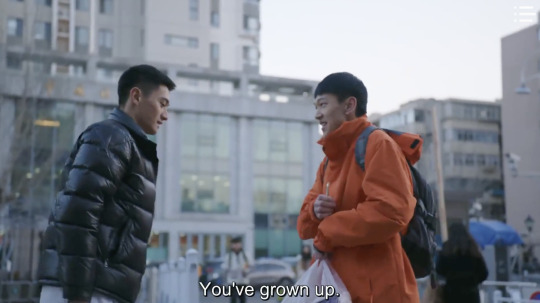

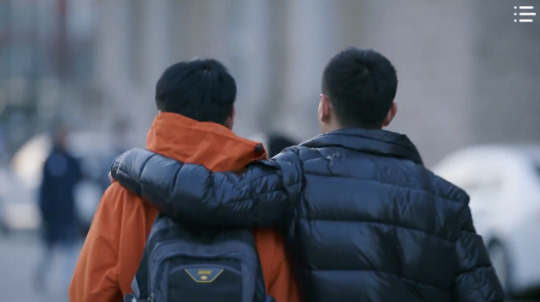
they grab milk tea together and catch up, reminiscing about their earlier years. unfortunately, whereas YY has never forgotten their first meeting, WF remarks that he would've forgotten about it entirely if not for YY mentioning it now.
then YY asks what will happen after WF graduates.


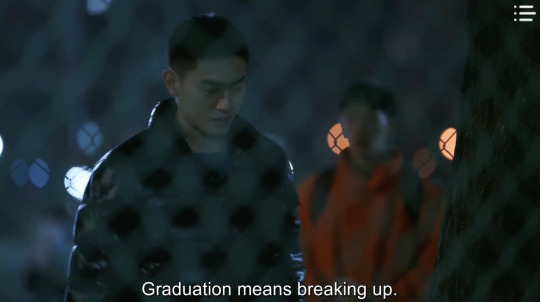
the camera cuts to a shot of the milk tea brand: 心意 / the intentions of my heart.
this milk tea shop is a recurring setting throughout this drama. it's where one of the main CPs (Li Ran & Yu Chengshan) had one of their earliest interactions in ep. 3, and it has consistently been romantically coded (e.g., a boy treating his crush to a cup of milk tea).

so, effectively, as WF tosses away his empty cup, that is also signaling the short lifespan of his current relationship.
finally, WF encourages YY. only...
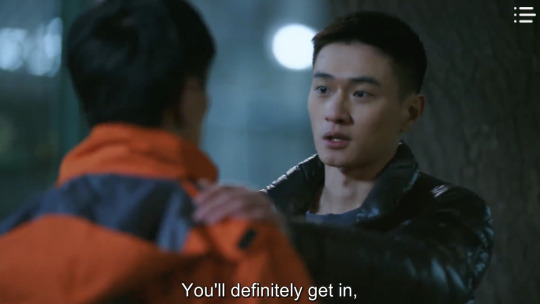
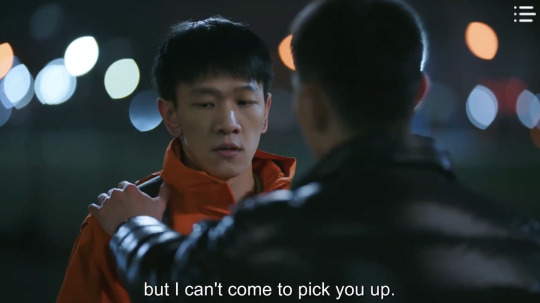
Wu Fan: I promised my mom I'll return home to take the civil service exam. After I graduate next year, I'll immediately go back to Xingzhou.

and then, once again, as YY sadly watches WF walk away, the camera cuts to the milk tea cup in his own hands.


in the end, Yu Yang never got to express his 心意 for his xuezhang, and he can only keep it to himself.
but as their Chinese teacher Tan Xiaozhou (谭小舟) remarked earlier in ep. 21 during their class on love poems:
Love is not only in the present tense or future tense, but also in the past tense. Having loved before doesn't mean that the current love isn't real. Loving now doesn't mean you won't love again in the future. If you didn't obtain it, or you broke up—without longing, without resentment—silently remembering the beautiful parts—bidding "Take care" in a cool demeanor: this, also, is love.
[...]
To me, the most important thing about love is that I can respect your independent nature, protect your lonely soul, and defend your right not to love me.
and so concludes our Class 11 xuezhang's 感情线. for a gaokao-prep cdrama that aired on CCTV8, i honestly cannot believe we got any of this.
here are two more small instances of queer acknowledgment:
in ep. 13, school psychologist Sang Xia (桑夏) leads a lecture on sexual harassment: what it looks like, how to prevent it, how to keep yourself safe. right from the start, she emphasizes that boys can be victims as well—and also that harassment can occur between same-sex individuals.
in ep. 21, when the school runs amok with dating rumors among the teachers, Sang Xia questions why everyone defaults to thinking that it must be a male teacher confessing to a female teacher.
overall, i seriously cannot recommend this show enough. it tackles so many themes (e.g., the premature grief of losing a loved one to Alzheimer's; the importance of destigmatizing depression and mental health overall; the hugely significant role that family/home life has on students' ability to perform well in school; that parents are not infallible and can be controlling/manipulative/abusive, even if unintentionally; that SES so greatly impacts the trajectory of a student's life; how damaging bullying/cyberbullying can be; and that though society is rife with inequity and injustice, it is the responsibility of adults—as best as they can—to create a more just and safer world for all children), and in both a realistic and gently heartwarming way.
#the hope#鸣龙少年#cdrama ramblings#the episodes on depression also hit especially hard for me#esp as someone who is training to be a psychologist#rly like how Sang Xia put it: psychologists are both teachers and doctors#this show really humanized these students and god i wish such compassion and empathy could always be extended to people with depression
23 notes
·
View notes
Note
Why do you think JK never made Snape care about Harry? I always expected thats where the story would go at one point but then it didnt at all... like at least a moment of effection or something
Several reasons, I think.
First, as I said in the other post, it was too late for Snape. He is the antihero, much more than Voldemort ever was, and he was set up to fail from the start. He would die with his unresolved issues deep in his soul - the guilt, the rage, the inability to trust and love another person (perhaps for fear of what that love would do to them, because look at what it had done to Lily). By the time Harry crashes into his life, Snape has find a modus vivendi - it’s dark and unpleasant and it keeps him in a lot of pain, but it’s all he knows, and we’re all afraid to let go of things that have kept us safe for years - even if those things are chains and cages. So, even at this moment when Snape would have the chance to start over and teach Lily’s child in the way he wishes he himself had been taught (the fact he was disagreeing with old textbooks at the age of sixteen shows quite clearly what he thought of the whole system) - well, that’s not something he considers. Consciously or subconsciously, he must have worried about what would happen if Harry refused him and mocked him, like James had done. What his colleagues would say if he suddenly changed his demeanour. What Harry himself would know about him - Snape doesn’t know how Harry grew up - what if Petunia had told him everything about ‘the Snape boy’, the weirdo who stalked her younger sister, the kid with the drunk father who was never quite clean and never quite tidy? I sort of believe that’s why Snape was so harsh on Harry during that first lesson - not only he saw James on his face and that hurt him deeply, but he was probably terrified Harry would know things about him - things only Lily could know, and what if she’d told Petunia, or if Harry had found her letters? So no, Snape never tried a different way, because the one he was walking - that was painful, but he already knew that pain he could bear. What if a new path brought him a pain he couldn’t bear?
(Which would have been the case, because if Snape had allowed himself to care about Harry, to love Harry, even, in this clumsy, childish, unfinished way that seems the only way he knows how to love people, how could he have let Harry die? He would have turned against Dumbledore, would have done anything to keep Harry safe like he’d done for Lily, and Dumbledore’s plans would have failed, and Voldemort would have won.)
Second, books need conflict, and since this was (allegedly) a children’s book, it needed conflict kids could easily get. The greasy, bullying teacher was a perfect character many kids could understand at once - and also an uncomplicated way to teach kids than life is not literature, and not all conflicts are resolved. If HP had been written in the Victorian era, then, why not, Snape would have had a dramatic change of heart and sobbed in Harry’s chest, begging for forgiveness; but personally, I like that JK Rowling chose to create a modern world full of real people, and this is how it works - Snape would probably have learned to get along with Harry, even to appreciate him - in time. And time is something he wasn’t given.
Third, what I really liked about including Snape, especially in the context of a war and the Order, is that this is how it works and we should tell children the truth: in difficult times, we need to make allies, and those allies will sometimes be - unpleasant. How much we’re willing to ignore, or forgive, when fighting side by side with someone - well, that’s mostly what defines groups and countries. Because the stupid thing is that we’re surrounded by war stories (mostly, movies about WW2, and enough) and yet those stories tend to be blissfully simple. Good guys on one side, bad guys on the other. Right. As if. In reality, what happens when you face a powerful enemy is that all of those who’re threatened by it need to decide if they can work together to bring it down. We’re never reminded enough of the fact the British government chose to do nothing against Hitler so that Hitler would crush trade unionists and the workers movements in Germany - they bet those left-wing groups would be much more of a threat than Hitler to Great Britain, and boy, were they wrong. Much in the same way, Communists and Anarchists tore each other apart in Spain, never realizing that Franco’s army would burn them all to the ground and impose a fascist dictatorship in the country that would last for decades. In Italy, on the other hand, Communists and Catholics worked together in the Resistance, and only returned to their ‘natural’ state of animosity after the war, when it could be expressed in Parliament, without guns and violence. So, well - the Order and Snape - I liked this idea that this man is on the right side of history, but he makes no concessions to it, because, on the whole, he’s not a nice man. He risks his life to save other people’s, but he will bully his students and he will actively dislike Harry and that’s not going to change.
And this brings me to another point: one of the most important messages of the book, to me, was what Sirius said to Harry, Ron and Hermione: “The world isn’t split into good people and Death Eaters”. This is a crucial teaching, and something that particularly young people, with their tendency to see things in black and white, should hear. It’s ironic it was Sirius saying that, since it’s debatable how much of a good person he was - I mean, don’t get me wrong, I adore him, but here’s someone who, like Snape, was never given the chance to grow up emotionally and is still blinded by the mindframe of his class (in Snape’s case, that was the deep-seated resentment of a working class kid, while in Sirius’ case, the careless, impatient privilege of the elite). Of course, Snape stood out in this category of people who’re supposed to be on your side but are still awful, and, again, the fact JK Rowling refused to redeem him by forgiving Harry for being is father’s son - that’s okay with me. It wouldn’t have felt right. It was too soon, things were too complicated between them, and - crucially - Snape never knew enough about Harry (never bothered to find out enough) to understand this was someone he could like. To him, Harry was always the child and and teen (I always read Snape as someone who was not particularly comfortable around either), the spoiled brat, the one who needed to get his way, who disregarded orders, never put any effort into anything, and would one day get his friends killed, just like his father. Because we know Harry, and we understand why he does what he does and we love him even when he’s not perfect, but to Snape, Harry was the guy who was so self-involved he didn’t even notice Hermione was time-traveling for one full year, the one who got to play Quidditich before everyone else just because he was ‘special’, the one who never bothered to study Legilimency just because he didn’t like being told what to do, the one who deliberately accessed Snape’s most private memories (and, come on, whichever way you look at it, that was a dick move) and probably laughed at what he saw for weeks afterwards (Snape never realized Harry was profoundly disturbed by those memories), and, finally, the one who almost killed a fellow student with his arrogant, reckless use of magic he didn’t know. So, as I said - Snape is still at fault here because he never bothered to get to know Harry, just decided to hate him on principle, but from is (warped) point of view there were reasons to objectively dislike Harry, and they didn’t have enough time together to correct those impressions of each other. I like to think Harry spent some time with portrait!Snape after the final battle, that they became friends this way, but who knows.
And finally, there’s no getting away from it: these are profoundly Christian books. JK Rowling’s faith shines through in the best possible way - and I say this as a non believer and as someone who doesn’t have a particular sympathy towards Christianity. There was, of course, the whole point about questioning God and raging at God and losing your faith, which basically was the theme of the entire seventh book and, even as a non religious person, I found that very moving and relatable; and Harry as a Christ figure, sacrificing himself to save humanity. But one of the most amazing things was something else: the whole ‘love your enemy’ message that was such an important part of the books and led to Harry winning and saving the world. Because here is where you really see how exceptional Harry was (especially if we consider he was a teenage boy): over and over again, he lets go of his pain and his anger and his fury, and chooses empathy instead. He never truly hated the Dursleys, despite everything, and saved Dudley’s life when he could have fled on his own. He spared Sirius’ life when he thought Sirius had killed his parents. He spared Pettigrew’s life when he knew Pettigrew had killed his parents. When he realized what Draco was actually going through, he felt pity, at once, for someone he’d solidly disliked for six years. In that train station, he managed to feel worry and compassion even for Voldemort, whose soul was an ugly, sad thing no one had ever wanted or loved. And, of course, he forgave Snape so thoroughly he ended up naming one of his sons after the man. I know some people were outraged by this, but I think they were simply missing the point. Harry is a Christian hero, and his special power is to do this incredibly difficult thing: to love unconditionally. To understand. To feel others’ pain (this was expressed, on a symbolic level, by his unwanted ability to feel his parents die). This is Jesus at his best, teaching us that it’s not the healthy man who needs a doctor; that loving someone when it’s easy to love them - that’s good, but it’s not enough. We rarely mention this part of the Bible nowadays (I guess ‘real’ Christians are having too much fun refusing to bake cakes for gay people to stop and reread the Gospels), but this was, and still is, a disturbing, revolutionary teaching. Because the thing is, you have the right to hate those who wronged you. It’s human, and it’s fair, and they deserve it. But ultimately (and this is where you see Eastern influences on Jesus’ thought), where does that hatred lead you? What good does it do? “What about my soul, Dumbledore? Mine?” Harry didn’t name his kid after Snape because his own pain didn’t matter; on the contrary, he did that not to redeem Snape, but to heal his own soul. Forgiveness, love, compassion - that’s the way forward. And it’s not just fiction, either - Harry chose to use Expelliarmus against Voldemort, and okay, but when Carlo Cattaneo, a philosopher and one of the leaders of the Italian 1848 revolution against Austrian occupation, saw a group of his own people about to lynch a collaborationist, he stepped in and told them, “If you kill him, you will be doing a justly thing; if you don’t kill him, you will be doing something saintly.” - the man was spared.
So, well, to wrap up this overlong essay - this last point, I feel, is crucial to understand why JK Rowling didn’t want Snape to have an easy way out. Harry needed to learn about trust and faith - as Lupin said, trusting Dumbledore meant trusting Snape, unconditionally - and Harry’s journey was not about being thanked and people changing his mind about him and recognizing he’d been a great guy all along; no, his journey was about learning to love even when it was difficult, even when it hurt, even when his whole soul turned into angry storms at the injustice of it. And Harry succeeded. He chose to bury Dobby rather than securing the most powerful weapon in existence, he chose to forgive Dumbledore for his many failings, and he chose - incredibly, saintly - to feel pity and compassion for a man who’d wronged him and tormented him for seven years, because, like his mother, he understood the way out is to love everyone, especially those who do not deserve our love. If Snape had been kind to him, had had a change of heart, Harry’s decision to forgive him would not have been as strong and meaningful as it was - and since this was Harry’s story, not Snape’s, Harry’s need to evolve as a character trumped Snape’s possibility of redemption.
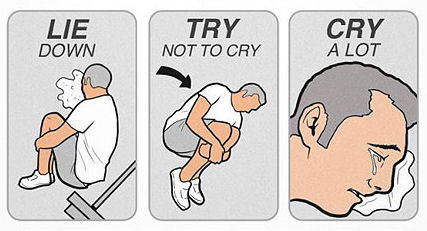
#ask#hp#jk rowling#snape#severus snape#redemption#love#seriously#those books are so christian#the fact some churches banned them#really shows you how stupid people can be#sorry for this long answer#may have bared my soul a little here#don't mind me#i'll be here#sobbing in my corner#god i love those books so much
86 notes
·
View notes
Text
Michael, 26, Teacher / Actor
What is the biggest frustration you’re facing now?
I would say professionally, my frustration is I’m trying to change how theater is viewed at my school. It just seems like a club as opposed to something that’s worth doing that has meaning, that can transform lives.
Personally my biggest frustration is the fact that my personal values don’t match up with my family’s values. My parents grew up in a very different time than I did and my brother unfortunately is beholden to them and agrees with them on a lot of things. I’m always seen as like the rebel or the one that has the progressive views and therefore my views are not welcome. So there’s a lot of tension in my household. We’re really not a family, you know, my dad and his brother hate each other and don’t speak. My mother and her siblings don’t speak and there was a whole lawsuit. So I don’t really have any sense of family in terms of like I have no extended family and even right now, my nuclear family….my brother doesn’t want to speak to me currently for a variety of different reasons. Mostly because he’s seeing someone. He met this girl and he hasn’t been behaving like himself and I told him he should start acting like himself and he told me never to speak to him again after that. Because we’re in this group chat with this fantasy football thing and he added her to the group chat and Ryan was always this snarky sarcastic kind of….he was my brother and he stopped acting like himself so I said “Ryan, why aren’t you acting like yourself?” Then he said “Please don’t speak to me ever again.” So that’s my personal frustration. And it sucks because that relationship with my brother meant the world to me. We were very close.
It’s hard because as the oldest sibling you’re expected to…like Ryan’s always the easy going one and to my parents, you know, I’m the problem. So it’s “How dare I say that.” And while any time I’ve ever dated anyone they didn’t really like or I wasn’t acting like myself they, of course, yelled at me. So the consistency is off. My parents criticize me a lot and I’m under the microscope all the time and my brother can do no wrong. So it’s hard.
2. What trait do you wish you most had?
Better time management. I think it would help me better with my career. What makes me a good actor is that I can live in the moment and that’s what makes me a good teacher because I’m here, I’m present and I’m with you. But I’m always late for everything. I’m always going to be five minutes late. I’m one of those people. I actively try not to be five minutes late and I am somehow two minutes late. I just over schedule. I take on too much. I’m always giving a piece of myself. Whether it’s like I have a meeting period six, but it’s lunch and a student comes in and is like “I need you,” I’m like “Alright I’m here! I’m with you!” And my supervisor tells me this all the time: you need to take more time for yourself. Weekends, weekdays, lunch, I’m always there for my kids, for my students, for my friends so I have a very poor sense of time management.
3. What are 3 characteristics you look for in a friend?
Loyalty, someone who gets my sense of humor, and kindness and compassion.
4. What makes you feel brave?
For a while it was my sheer will. Like “I just have to get through this.” Which is why my favorite super heroes are Batman and Dare Devil because….especially Dare Devil. I super identify with Dare Devil because his whole thing is he gets knocked down, he gets back up, like, why does he keep getting back up?
But I think it’s my friends and the people I care about that make me feel brave. That’s what motivates me to get back up, to get hit again.
5. What makes you feel vulnerable?
That’s a hard question for me as an actor because my job is to be vulnerable in every role I do. So everyone gets to see my deepest pain, my deepest fears, my deepest love, but through someone else. So I would say art makes me feel vulnerable; singing, expression makes me feel vulnerable, but you’ll never know that it’s me. In terms of being truly vulnerable, I would say safety. Someone I can trust makes me personally feel vulnerable. They can see my deepest pain is what it is. I tell my kids this all the time: your job as an actor is to be honest, open, vulnerable with a character, but no one will ever know what your pain is. They’ll see the pain, but they won’t know it’s yours. They’ll see it as the character’s. So that’s how I’ve been my entire life just sharing my pain through the characters I play. For someone to recognize what that pain is in my life, it’s trust, it’s safety.
6. What was your proudest moment?
When my students grow or when I see them become people and embrace their talents. For example, I have this one student that hated reading, he’s a senior so he’s done with high school, the whole thing. I showed them The Truman Show before we started reading “The Stranger.” He watched it and he was like shooketh by the movie! He’s like “Hey Mr. B I really want to read this book cuz I love the movie.” And he read the book and he participated! This was a kid that played games most of the time in class. So that was a proud moment.
I have this one student, she’s Thelma [in the school production of Chicago] and she has so much anxiety. When she believes in herself, that’s when I feel pride because….when you see someone who’s so insecure about themselves and struggling, because you know high school kids, especially today, have a lot to deal with, so seeing her find herself, even in the briefest moments makes me proud because I’m helping. So that makes me proud. Being there for other people and seeing my influence. Well, it’s not me, it’s them. It’s more knowing that I was there to help them along the path and help them be the person they were always meant to be.
7. Who is your role model / hero and why?
My dad. Its funny because all the super heroes I idolize it’s because of the will, if you know what I mean. That’s my dad. He spends most of the time getting beaten down by life and he always got back up. He provided for his family and always made sure that we were taken care of. I am who I am because of him, so yeah, he’s my hero. That’s what he gave me. I hope to be half the man that he is. He provides for his family, he takes care of his wife. He’s supremely loyal and he’s a good looking charming guy. He never strayed. He always had a good internal moral compass and that’s something I try to emulate. He tries to instill that in his sons. Like when you think of like “That’s a good man,” that’s my dad. He’s a good man. He’s not a great man, but he’s a good man. And he loves his kids and he loves his wife. That’s a hero to me.
8. What is one life lesson you’d like to pass down to future generations?
Always challenge yourself to be better. If you look at any religion, any book, anything, at the central point of it is to challenge you to be better. So my hope is that future generations challenge themselves to always be better because we will always fail, we will always be human, we will always make mistakes and the goal is to learn from those mistakes. Just challenge yourself. “You know, I messed up, I’ll be better tomorrow.” That’s all you can hope for is that you just be better. With compassion, with empathy, with being kinder. I think it’s very easy to fall into a hole where you’re like, “Well it’s all about me.” No, just be a better version of yourself to others, to yourself. I think if we all try to do that individually, that will be better for the collective common good.
9. What is your opinion of Jesus?
I went to a Catholic school for a very long time. My opinion is the current Catholicism, Christianity, has him all wrong. The man was brown, he was progressive, and he was a radical and they killed him for it. We are currently living in a country where Christianity is essentially the main religion to the point where it is infused into our laws, our society even though we say church and state separate, you know, it’s not. To me, he is a figure who is being used by many to support their own agendas and hate and it makes me sad because I don’t think that’s what he would have wanted. If you read the Bible, which I have many times for a lot of different assignments, the established Christianity is not what I feel like Jesus would have wanted. Which is why I have turned away from it. I joke that I know too much. In that, yeah, I’ve done my Bible study, I’ve read it several times and it upsets me to see where we’ve gone. Unfortunately, we’re in a time in politics where conservatives are using religion to justify a lot of hate, a lot of bigotry, a lot of things that aren’t really important. To me, Jesus was a man, depending on what you believe, might also have been God who came down and said “Let’s forgive and let’s care about each other more.” Let’s love each other. Even our enemies. I think that’s lost currently in modern day society in so many ways. I think if we could actually take the time to go back to that, it might fix a lot of the problems.
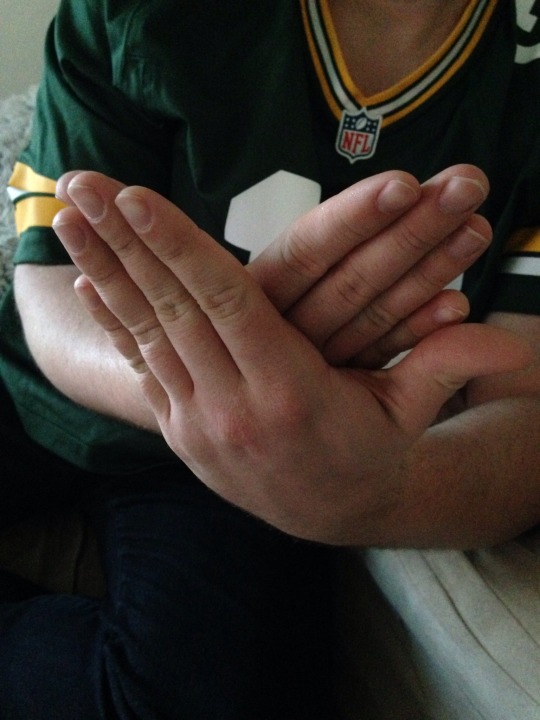
#Questions#nine#interview#conversation#Jesus#Christianity#Catholic#Theater#teacher#actor#Batman#Dare Devil#school#kids#students#real#reality#opinions#ideas#advice#dad#role model#loyalty#humor#compassion#talking#talk#February#2019#Millennials
0 notes
Text
To give, to receive and to dance.
This is a bit too long but do still read it till the end.
------------
Graduation address by Nipun Mehta, on May 27, 2013
When the student body of an elite private school in Silicon Valley was given the chance to vote on who
would give their graduation address this year, they chose a man named Nipun Mehta. This is the speech
that Nipun Mehta delivered.
Thank you Jennifer Gargano, Chris Nikoloff and the entire faculty at Harker. To you, the class of 2013,
congratulations! I’m delighted to be with you on your special day, and it is a particular honor since I
know you chose your speaker.
So, graduation day is here and this once-in-a-lifetime milestone moment has arrived. In the words of
Taylor Swift, I can tell how you’re feeling: “happy, free, confused, and lonely, miserable and magical at
the same time.” Who would’ve thought we’d be quoting words of wisdom from Taylor Swift at your
commencement.
Today, I’m here with some good news and bad news. I’ll give you the good first.
You might be surprised to hear this, but you are about to step out into a world that’s in good shape - in
fact the best shape that that it’s ever been in. The average person has never been better fed than today.
Infant mortality has never been lower; on average we’re leading longer, healthier lives. Child labor,
illiteracy and unsafe water have ceased to be global norms. Democracy is in, as slavery is disappearing.
People don’t have to work as hard to just survive. A bicycle in 1895 used to cost 260 working hours,
today we’ve gotten that number down to 7.2.
So, things are progressing. But I’m afraid that’s not the full story. You’ll want to brace yourselves,
because this is the bad news part.
This week, Time Magazine’s cover story labeled you guys as the “Me, Me, Me” generation; the week
before, NY Times reported that the suicide rate for Gen X went up by 30% in the last decade, and 50% for
the boomer generation. We’ve just learned that atmospheric carbon levels surpassed 400 PPM for the first
time in human history. Our honeybee colonies are collapsing, thereby threatening the future of our food
supply. And all this is just the tip of the iceberg.
What we’re handing over to you is a world full of inspiring realities coupled with incredibly daunting
ones. In other words: miserable and magical isn't just a pop-song lyric - it's the paradox that you are
inheriting from us.
So, what do you do with that? I’m going to be honest - I don’t really know. I do know this, though:
At the core of all of today's most pressing challenges is one fundamental issue: we have become
profoundly disconnected.
Rather ironic, considering that we live in an era where Facebook has spawned 150 billion “connections”,
as we collectively shell out 4.5 billion likes on status updates, every single day. Yet, a growing body of
science is showing what we already feel deep in our gut: we’re more isolated than ever before.
The average American adult reports having just one real friend that they can count on. Just one. And for
the first time in 30 years, mental health disabilities such as ADHD outrank physical ones among American
children.
Somehow we’ve allowed our relationship to gadgets and things to overtake our real-world ties. We’ve
forgotten how to rescue each other. Yet, deep inside we all still have that capacity. We know we have it
because we saw it at Sandy Hook, in the brave teachers who gave up their lives to save their students.
We saw it during the Boston Marathon when runners completed the race and kept running to the nearest
blood bank. We saw it just this week in Oklahoma when a waiter at a fast food chain decided to donate
all his tips to the tornado relief efforts and triggered a chain of generosity.
So we know that we can tap into our inner goodness when crisis strikes. But can we do it on a run-of-
the-mill Monday?
That’s the question in front of you. Will you, class of 2013 step up to rebuild a culture of trust, empathy
and compassion? Our crisis of disconnection needs a renaissance of authentic friendship. We need you
to upgrade us from Me-Me-Me to We-We-We.
Reflecting on my own journey, there have been three keys that helped me return to a place of connection.
I’d like to share those with you today, in the hope that perhaps it might support your journey.
The First Key Is To Give
In the movie Wall Street - which originally came out well before you guys were born - there’s a character
named Gordon Gekko whose credo in life reads: Greed is Good. When I was about your age, Silicon Valley
was in the seductive grip of the dot-com boom. It was a time when it was easy to believe that Greed was
Good. But a small group of us had a different hypothesis:
*Maybe* greed is good, but Generosity is better.
We tested that hypothesis. When I startedServiceSpace, our first project was to build websites for
nonprofits at no charge. We ended up building and gifting away thousands of sites, but that wasn’t our
main goal. Our real purpose was to practice generosity.
In the early days, the media was pretty sure we had a hidden agenda. "We're doing this just to practice
giving with no strings attached," we said. The few who actually believed us didn’t think we could sustain
it. The thing is - we did. A decade later, when our work started attracting millions of viewers,
entrepreneurs told us that we'd be crazy to not slap on ads or try to monetize our services.
The thing is - we didn't. We probably *were* a bit crazy. And when we started Karma Kitchen, people
really thought "No way!" It was a restaurant where your check always read zero, with this note: "Your
meal is paid for by someone before you, and now it’s your chance to pay it forward." The thing is - 25
thousand meals later, the chain continues in several cities around the globe.
People consistently underestimate generosity, but human beings are simply wired to give.
In one study at Harvard, scientists surprised a couple hundred volunteers with an unexpected monetary
reward and gave them the choice of keeping it or giving it away. The only catch was that they had to
make the decision spontaneously. Lo and behold, the majority chose - to give away the money! Greed, it
turns out, is a calculated after-thought. Our natural instinct is, and always has been, to give.
When you take Economics 101 in college, you will learn that all of economics is rooted in the assumption
that people aim to maximize self-interest. I hope you don’t just take that for granted. I hope you
challenge it. Consider the likes of Mahatma Gandhi and Martin Luther King Jr. and Mother Teresa, who
have rocked the history of our planet with the exact opposite assumption, with the belief in the
goodness of our human nature.
Or consider Ruby Bridges:
Six-year-old Ruby was the first African American girl to go to an all-white school on Nov 14, 1960. All
the teachers refused to teach her, except for one Mrs. Henry. Ruby received constant death threats and
on the way to class every day, people would line up to shout and throw things. Mrs. Henry instructed
Ruby to not speak to anyone, as she crossed the jeering crowds every day. But one day, she saw Ruby
saying something, so she said, “Ruby, I told you not to speak to anyone.” “No, Mrs. Henry, I didn’t say
anything to them.” “Ruby, I saw you talking. I saw your lips moving.” “Oh, I was just praying. I was
praying for them,” Ruby responded. Then she recited her prayer, and I quote “Please, God, try to forgive
these people. Because even if they say those bad things, they don’t know what they’re doing.”
A six year old! Wishing well for those who were wishing her harm. How generous is that? And what does
it say about the power of the human heart?
Our capacity to love is a currency that never runs out.
May each of you tap into that generous ocean and discover every day, what it means to give.
The Second Key Is To Receive
When we give, we think we are helping others. That's true, but we are also helping ourselves. With any
act of unconditional service, no matter how small, our biochemistry changes, our mind quietens, and we
feel a sense of gratefulness. This inner transformation fundamentally shifts the direction of our lives.
A couple summers ago, we had two 14-year-olds, Neil and Dillan, interning at ServiceSpace. One of their
projects was a 30-day kindness challenge - they had to come up with and do a different act of kindness
every day for a month. In the beginning they had to plan "kindness activities", but slowly they learned
how to spontaneously turn their daily life into a canvas for giving. Doing the dishes for mom without her
asking, stopping to help a stranger with a flat tire, standing up for a bullied kid, gifting all their winnings
at the arcade to a child.
Very quickly, kindness shifted from being an activity - to a way of life.
It wasn't just about who they were helping; it was about who they themselves were becoming through
the process. Last weekend, I happened to see Neil after a while, the day after Senior Prom, and he had a
story to share, "Last night I noticed that the dance floor was too small and a few of the special needs
students just couldn't get on. So I grabbed a bunch of my friends, and we started dancing in a little
circle around them. Everyone had a great time." Then, he paused for a reflective moment, and asked me,
"But I felt so good about doing that. Do you think I was being selfish?"
What a profound question. What Neil experienced was the fact that when we give, we receive many times
over.
Or as the Dalai Lama once put it, "Be Selfish, Be Generous.” It is in giving that we receive.
When we think of generosity, we typically think of it as a zero sum game. If I give you a dollar, that’s one
less dollar for me. The inner world, though, operates with an entirely different set of rules. The
boundaries aren’t so easy to decipher. Your state of being inherently affects my state of being. This isn’t
feel-good talk. It’s actual science. Research shows that, in close proximity, when people feel connected,
their individual heartbeats actually start to synchronize - even with zero physical contact. In
neuroscience, the discovery of mirror neurons has shown us that we literally do feel each other’s pain -
and joy.
And joy is *definitely* not a zero-sum game. The law of abundance says that if I give you a smile, that's
not one less smile for me.
The more I smile, the more I *do* smile. The more I love, the more love I have to give. So, when you give
externally, you receive internally. How do the two compare? That's a question only you can answer for
yourself, and that answer will keep changing as your awareness deepens.
Yet this much is clear: if you only focus on the externals, you’ll live your life in the deadening pursuit of
power and products. But if you stay in touch with your inner truth, you will come alive with joy, purpose,
and gratitude. You will tap into the law of abundance.
May you discover that to be truly selfish, you must be generous. In giving, may you fully experience what
it means to receive.
The Third Key Is To Dance
Our biggest problem with giving and receiving is that we try and track it. And when we do that, we lose
the beat.
The best dancers are never singularly focused on the mechanics of their movements. They know how to
let go, tune into the rhythm and synchronize with their partners.
It’s like that with giving too. It's a futile exercise to track who is getting what. We just have to dance.
Take one of my friends for example, a very successful entrepreneur.
Along his journey, he realized that it’s not just enough, as the cliché goes, to find your gifts. Gifts are
actually meant to be *given.*
In his daily life, he started cultivating some beautiful practices of generosity. For instance, every time he
walked into a fancy restaurant, he told the waiter to find a couple that is most madly in love. "Put their
tab on my bill, and tell them a stranger paid for their meal, with the hope that they pay it forward
somewhere somehow," he would say. Being a fan of Batman, he took his anonymity seriously: "If anyone
finds out it was me, the deal is off."
Many restaurants, and waiters, knew him for this. And as a food connoisseur, some of his favorite places
were also quite pricey - upwards of a couple hundred bucks per person.
On one such day, he walks into a nice restaurant and does his usual drill. The person serving him
obliges. However, this time, the waiter comes back with a counter request. "Sir, I know you like to be
anonymous, but when I told that couple about the tab being covered, the woman just started sobbing. In
fact, it’s been ten minutes and she's still tearing up. I think it would make her feel better if you were to
just introduce yourself, just this once."
Seeing this, he agrees to break his own cardinal rule and walks over to introduce himself. "M'aam, I was
only trying to make your day. If it has brought up something, I'm so sorry." The woman excitedly says,
"Oh no, not at all. You’ve just made my year, maybe my life. My husband and I, well, we work at a small
nonprofit with physically challenged kids, and we have been saving up all year to have this meal here. It
is our one year marriage anniversary today.” After a pause, she continues, “We always serve others in
small ways, but to receive a kind act like this on our special day, well, it’s just an overwhelming
testimonial that what goes around comes around. It renews our faith in humanity. Thank you. Thank you
*SO* much."
All of them were in tears. They kept in touch, he joined their board and they are friends to this day.
Now, in that scenario, who was the giver? Who was the receiver? And more importantly, does it even
matter? Dancing tells us to stop keeping track.
Sometimes you're giving and sometimes you're receiving, but it doesn't really matter because the real
reward of that give and take doesn’t lie in the value of what’s being exchanged. The real reward lies in
what flows between us – our connection.
Conclusion
So, my dear friends, there you have it. The bad news is that we're in the middle of a crisis of
disconnection, and the good news is that each and every one of you has the capacity to repair the web -
to give, to receive and to dance.
Sometime last year, I spontaneously treated a homeless woman to something she really wanted - ice-
cream. We walked into a nearby 7-11, she got her ice-cream and I paid for it. Along the way, though, we
had a great 3-minute chat about generosity and as we’re leaving the store, she said something
remarkable: "I'd like to buy you something. Can I buy you something?" She empties her pockets and
holds up a nickel. The cashier looks on, as we all share a beautiful, awkward, empathy-filled moment of
silence. Then I hear my voice responding, “That’s so kind of you. I would be delighted to receive your
offering. What if we pay-it-forward by tipping this kind cashier who has just helped us?” Her face breaks
into a huge smile. “Good idea,” she says while dropping the nickel into the tip-jar.
No matter what you have, or don’t have, we can all give. The good news is that generosity is not a luxury
sport.
Dr. Martin Luther King Jr. said it best, when he said, "Everyone can be great, because everyone can
serve." He didn't say, "You have to be smart to serve." Or "You have to be famous to serve." Or "You have to be rich to serve." No, he said, "*Everybody* can be great, because *everybody* can serve. You don't have to make your subject and verb agree to serve. You don't need to know the second law of
thermodynamics to serve. You only need a heart full of grace. A soul generated by love."
Harker Class of 2013, may you ALL find greatness in service to life. May you all give, receive - and never,
ever, stop dancing.
0 notes
Text
99 Basic Ways To Show Kindness.
G. P. dispute candidates simply suggested compassion and therapy for (white) heroin addicts, after that dismissed (black) victims of authorities violence. Study indicates that the recipient of kindness isn't the only individual that profits. For more info in regards to kindness diaries episodes, denikrozvoje.info, look at our own webpage. Our kindergartners have created a Kindness Rocks Garden with the help of various other pupils, staff, and parents. Art kind exercised by emo eunuchs that fetishize a certain female and also promote their fetish by producing a definition for her on Urban Thesaurus. Fortunately, according to the new Children & Family members Reading Record by Scholastic, is that greater than 3 from 4 moms and dads who have children ages 5 and also younger begin reading aloud prior to their youngster reaches his first birthday celebration.
There are a lot more aspects in Personality 5 compared to previous installments so total immunity is no more an option, yet it's feasible to get close. A person that has genuinely repented from denial of Christ to faith in Christ will offer evidence of an altered life (2 Corinthians 5:17; Galatians 5:19 -23; James 2:14 -26). Children obtain really right into this and also they in some way inherently recognize this is producing a spiritual space.
Generosity is respect and also helping others without awaiting somebody to assist one back. A queen or woman of royal descent, that posesses fantastic elegance, honesty, nobleness of heart and generosity, personality as well as intelligence. Today, our leading international obstacle is to bring back the greatness of America, based on telling the truth, a commitment to peace, as well as regard for civil liberties at home and standard human rights around the world.
Additionally, feel free to use the artwork/ quotes in the tales to share your personal story on social. Load out this easy form as well as your place will be instantly included to this Generosity map if you would like to be included to the 2016 map. With its arrival in the West nonetheless, yoga exercise started to attract a huge female adhering to.
Fifteen years earlier, a group of trainees in Duvall, Washington, asked wellness instructor Peggy McKey Filer if she would certainly advise a brand-new senior high school club called Random Acts of Compassion. In addition to being a leader of games and a supporter of human awesomeness, Julia is a yoga instructor, aerialist and regular pizza-eater.
If you could comprehend exactly what you're reading, you'll be smarter compared to most children." After I review all the books in our program, I started checking out the classroom's collection of Encyclopaedia Britannica. Be the living expression of God's compassion; generosity in your face, kindness in your eyes, generosity in your smile. If, nonetheless, this is your initial Personality game, there are a few points it comes in handy to understand before embarking on your trip.
Like all current Persona games, the most up to date iteration will certainly enable making think you're a Japanese senior high school student with a secret identity. Your objective ought to you approve it: Round up your team as well as carry out an act of compassion this weekend as well as make sure to label #GetKind and # on your tales and photos. Weekly post consist of suggestions as well as devices for making kindness and service tasks help every household.
Exactly what we discovered is that only 25% of work successes are forecasted by IQ, 75 percent of work successes are forecasted by your positive outlook levels, your social support as well as your capability to see stress as a difficulty as opposed to as a danger. You may unknown why the challenge is taking place to you in the minute, however I assure you a blessing will appear of it down the road.
Sink The Pink welcomes some 3,000 club children to a venue in eastern London for nights of celebrity performances, contests and lip sync battles. To cultivate empathy in kids, start by modeling compassion: Research recommends empathy is contagious, so if you wish to aid compassion spread in the future generation, lead by example. Fusion dishes for these are given in the Personas guide, but note that for the final Identity you'll should have actually achieved Emperor Rank 6 as well as Hanged Male Ranking 8. You can discover them in the Velvet Room.
By observing these many reputable cycles in nature, we can better understand the Regulation of Granting and Receiving, one of the Seven Spiritual Laws of Yoga exercise as shown by Deepak Chopra. Select a minimum of one activity to carry out with your pupils throughout the month to maintain compassion in the spotlight in your classes! But amongst couples that not just sustain, yet live happily with each other for years and also years, the spirit of compassion and generosity overviews them onward.
0 notes